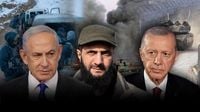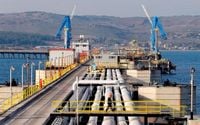In a move that signals a seismic shift in both regional energy politics and Turkey’s foreign policy toolkit, President Recep Tayyip Erdogan has issued a decree terminating the decades-old oil export agreement between Turkey and Iraq. This decision, effective from August 2026, comes as Ankara simultaneously faces scrutiny for its systematic use of nongovernmental organizations (NGOs) abroad to advance its political and ideological agenda, blurring the lines between humanitarian aid and statecraft.
According to a letter sent on June 17, 2025, by Turkish Foreign Minister Hakan Fidan to the Parliament Speaker’s Office—obtained and reported by Nordic Monitor—the Turkish state closely monitors and coordinates the activities of Turkish NGOs operating abroad. Fidan’s letter reveals that these organizations, often seen distributing food, clothing, and hygiene supplies, are also expected to enhance Turkey’s international visibility and expand its soft power influence. “Our ministry also organizes coordination meetings with NGOs engaged in external aid activities, with the participation of relevant institutions and organizations, and engages in various information-sharing efforts regarding issues that should be taken into account in the countries where they operate,” Fidan wrote.
This close coordination, the letter states, is not a mere suggestion. Turkish NGOs are instructed to operate “in close coordination with Turkish embassies and consulates” to ensure their activities align with Ankara’s foreign policy priorities. The foreign ministry holds regular meetings with NGOs and other state institutions to shape overseas activities and provide guidance on what issues to prioritize. This approach, critics argue, transforms NGOs from independent civil society actors into instruments of state influence—sometimes at the expense of genuine humanitarian work.
One of the most striking revelations in Fidan’s letter is the involvement of Turkey’s National Intelligence Organization (MIT) in these coordination efforts. Over the past decade, MIT has aggressively expanded its overseas operations, embedding agents in NGOs and using humanitarian work as a cover to develop assets, recruit informants, and gather intelligence on groups and individuals opposed to the Erdogan regime. Fidan himself, during his tenure as head of MIT from 2010 to 2023, relied heavily on this strategy. The foreign ministry’s own intelligence unit, the Intelligence and Research Directorate, also plays a role—providing the interior ministry with information on Turkish NGO activities and issuing guidelines on their operations.
The Foundation for Human Rights and Freedoms and Humanitarian Relief (IHH) is perhaps the most prominent example of this dual-use approach. Active in 123 countries, with nearly 100,000 volunteers and a 2024 budget of 9.2 billion Turkish lira, IHH has been accused of transporting arms and fighters to jihadist groups in Syria and Libya under the guise of humanitarian aid. These activities, openly backed by the Erdogan government, have raised alarm bells in numerous host countries, particularly where funds have been suspected of ending up in the hands of radical organizations.
Another key player is the Aziz Mahmud Hüdayi (Hudayi) Foundation, which operates dozens of entities in Africa and Asia. Wiretaps published by Nordic Monitor in 2020 and 2023 reveal direct involvement by President Erdogan in securing land for the foundation in Niger and Gabon. In one recorded conversation, Erdogan told businessman Mustafa Latif Topbaş, “We got land [for the foundation] in Gabon. We can discuss it when I get back. They [the Gabon government] first provided around 2,500 square meters [of land], and then they increased it to 20 acres.” The Topbaş family, known for their financial support of Erdogan’s Islamist policies, is deeply entwined with the foundation’s operations.
Connections extend further. The Turken Foundation, registered in 2014 as a nonprofit in the United States, serves the American Muslim community and facilitates the arrival of Turkish students—many of whom are exposed to political Islamist ideology. Turken’s founding organizations, the Ensar Foundation and TÜRGEV, both have close ties to Erdogan’s family and have channeled support into youth initiatives aimed at promoting political Islam. These organizations have also faced scandals and criticism, such as sexual abuse cases involving minors in Ensar’s dormitories in Turkey. Young people nurtured by these groups often find themselves fast-tracked into government positions, reinforcing the administration’s long-term strategy to reshape Turkish state institutions.
This systematic use of NGOs as instruments of foreign policy comes at a time when Turkey is also recalibrating its economic and geopolitical relationships. On July 20, 2025, Erdogan issued a decree terminating the 1973 oil export agreement with Iraq, which had allowed the shipment of Kirkuk oil to the Turkish port of Ceyhan. The decision, effective August 2026, ends a 52-year-old pact that was once vital for Iraq’s oil export alternatives—especially during times of regional conflict and sanctions.
The rationale behind this move is multifaceted. As reported by regional analysts, Turkey’s ambitions now center on the Development Road project, a sweeping initiative to connect Turkish ports to Iraq’s Basra oil fields and launch new petrochemical and refinery projects. Ankara envisions this as a qualitative economic shift, linking its economy to Gulf and Asian markets and positioning itself as a central corridor for international trade and energy lines to Europe. However, the timing of the termination—amid Iraq’s political instability and looming elections—raises questions about whether a new, long-term agreement is feasible in the near future.
The Kirkuk-Ceyhan pipeline, with a capacity not exceeding 500,000 barrels per day, has long been subject to attacks by armed groups, including the Kurdistan Workers’ Party (PKK). Security risks have only increased with the recent Israeli-Iranian war and threats to close the Strait of Hormuz. Iraq, meanwhile, filed a complaint with the International Chamber of Commerce (ICC) in 2014, arguing that Turkey had exported oil from Iraqi Kurdistan without Baghdad’s consent. The ICC ultimately fined Turkey around $1.5 billion but allowed it to recoup certain costs, leaving both sides with unresolved grievances and ongoing financial disputes.
Political divisions within Iraq have complicated matters further. The Baghdad-Erbil split, exacerbated by disputes over Kirkuk’s oil fields and revenue-sharing, has prevented the emergence of a unified negotiating position. The Kurdistan Regional Government’s separate arrangements with Turkey and international banks have only deepened the rift. Attempts to resolve these issues through internal dialogue have failed, and the recent ruling by Iraq’s Federal Supreme Court restricting exports to the state oil company SOMO has added another layer of complexity.
For Turkey, the decision to terminate the agreement is also a form of leverage. Ankara hopes to pressure Iraq into signing a new deal that aligns with its Development Road vision and expands Turkish economic influence in Iraq’s energy and investment sectors. Recent suggestions from Ankara include extending pipelines to the Basra oilfield and constructing petrochemical facilities on Turkish soil. Yet, with Iraq’s government in flux and the region’s geopolitics in turmoil, nothing is guaranteed.
Amid these developments, Turkey’s dual strategy—using both hard economic leverage and soft power through NGOs—underscores its ambition to play a pivotal role in shaping the region’s future. However, critics warn that blurring the line between humanitarian aid and political influence risks undermining trust in genuine civil society work and could further destabilize an already volatile region.
As Turkey looks to the future, its ability to balance these competing interests—projecting power abroad while maintaining credibility at home—will be tested like never before.





